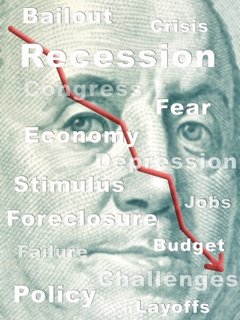 If you’re having trouble meeting mortgage payments, you certainly are not alone.
If you’re having trouble meeting mortgage payments, you certainly are not alone.
The Mortgage Bankers Association recently reported that the national foreclosure rate is now at 3.3%, and over 11% of all mortgages are either delinquent or in the process of foreclosure.
Now, due to the state of the economy, even some homeowners who are still managing to keep up with payments are being tempted to abandon the mortgage and start over.
If you’ve been thinking of making that move, first consider what it will do to your credit rating.
A repossession on your credit report will instantly reduce your FICO score by at least 100 points – and it doesn’t matter if you walked away voluntarily or were forced out through foreclosure.
Worse, after a foreclosure, the lender can still come after you for any difference between what you owed and what they are able to gain through the eventual sale of the house.
For some, a better alternative is the short sale. In this case, the bank agrees to forgive that difference and mark your debt paid. If you’re very lucky, they will even report it to the credit bureau as “paid satisfactorily” so that it doesn’t damage your credit score. If they report it as “settled for less than the full amount due” your score will take a hit, just as if you’d gone through foreclosure.
The big benefit is that if this was your primary home and the forgiven debt was less than $1 million ($2 million for couples filing jointly) then you will not owe income tax on the forgiven debt. This, by the way, is a temporary tax law change and only affects debt incurred between 2007 and 2012.
A better alternative to either foreclosure or a short sale is negotiation. Lenders really don’t want to own houses. It costs money, and what they want is money coming in, not going out.
If you’re falling behind financially, contact your lender right away and work to negotiate a lower rate or other terms that will allow you to keep the house and stay afloat.
If you need help with these negotiations, you can get it – at no charge. The National Foundation for Credit Counseling recently got $16 million in federal funding to help troubled homeowners, and has trained counselors who will assist in negotiations.
HUD also has approved counselors in every state who don’t charge anything to help homeowners stay in their homes. To find a counselor in your state, go to http://www.hud.gov/foreclosure/local.cfm
Under the Homeowner Affordability and Stability Plan, the government is offering help to up to 9 million families so they can avoid foreclosure. So don’t wait – if you need help, ask for it.
Note* The National Foundation for Credit Counseling warns that it is not necessary to pay for help with your negotiations. Stay away from companies that offer to help for $500, $1,000, and even $1,500. Often these services are bogus – and they’re always available for free.
Author:Marte Cliff
CreditScoreQuick.com your resource for free credit reports, credit cards, loans, and ground breaking credit news



